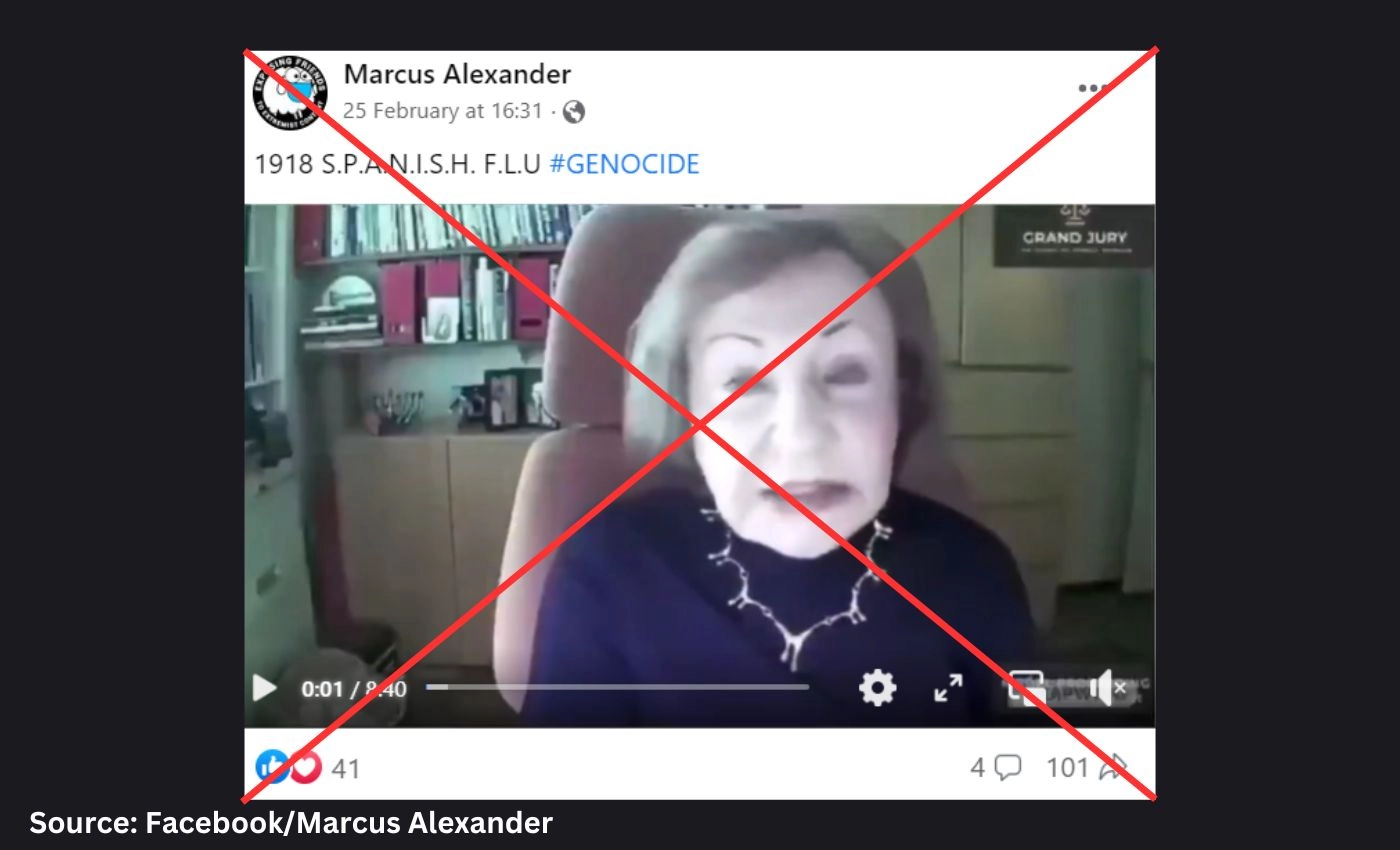By: Rajini KG
March 15 2023
False: The experimental Spanish flu vaccine tested in 1918 caused the Spanish flu, not the virus.

The Verdict False
There is no evidence showing an experimental vaccine caused the 1918 pandemic. CDC says an H1N1 virus caused it.
Context
A Facebook video about the Spanish flu is circulating on social media. One of the Facebook users posted a video related to the Spanish flu with the caption "1918 S.P.A.N.I.S.H. F.L.U #GENOCIDE." In the video, a woman asserts that the "Spanish flu was caused by an experimental vaccine tested at U.S. military camp." She further makes many other unsubstantiated claims linked to conspiracy theories stating John D Rockefeller, Andrew Carnegie, and Alexander Graham Bell funded a massive lobbying campaign to control the American population in 1918.
However, no evidence exists to corroborate that an experimental vaccine, not a virus, led to the Spanish flu pandemic.
In fact
A reverse image search using a screengrab of the video led us to many TikTok clips that had recently become viral. Through the clips, we identified Vera Sharav, a controversial "medical activist" and the Alliance for Human Research Protection founder— a non-profit whose goal is to make citizens aware of their "right to informed consent to medical research and medical procedures."
According to the Centers for Disease Control and Prevention (CDC), 20 to 50 million people died from the Spanish flu worldwide, most of whom perished during a second deadly wave. The first wave of the pandemic was observed in March 1918, the second wave during fall of 1918, and the third wave in October 1918. The CDC also maintains that there is no universal consensus regarding where the virus originated. An article published by the National Center for Biotechnology Information (NCBI) in 2004 also acknowledges that while several hypotheses exist regarding the virus's origin, it is uncertain where the 1918 flu first appeared.
In the United States, the flu was first detected in March 1918 in Fort Riley, Kansas, where more than 100 cases were reported at a military camp called Camp Funston. The military movement during the then-ongoing First World War (1914-1918) is believed to have aided the spread of the flu.
According to the World Health Organization (WHO), researchers in the U.S. and Europe were attempting to create a viable influenza vaccine during the pandemic years of 1918–1919. They believed that a bacteria was causing influenza and had identified many bacteria that they believed caused the illness. They also studied experimental vaccines, but none of the vaccines succeeded in targeting the Spanish flu. WHO also reports that researchers and scientists in 1918 and 1919 were targeting the wrong pathogens. Later, in 1933, scientists discovered that a virus, not bacteria, caused the Spanish flu. The two British scientists who isolated and discovered the Spanish flu virus or the influenza A virus found no bacteria in throat washings from patients with the flu.
As claimed in the viral video, a vaccine prepared at The Rockefeller Institute was indeed administered at Camp Funston in 1918, but this vaccine was an anti-meningitis vaccination targeting a bacterial infection, not a viral infection. A report on anti-meningitis vaccination on the NCBI website said an epidemic meningitis outbreak reportedly occurred in October and November 1917 at Camp Funston, Kansas. At least 3,700 participants received the anti-meningitis vaccination (meningococcus vaccine) made with inactivated strains of the meningococcus bacteria before Spanish Flu cases were reported from the camp. The doses hardly produced anything more severe than the mildest local and general side effects, including "headache, joint aches, and nausea," and rarely diarrhea. There is no indication in the report that this bacterial vaccine was prepared to target the Spanish flu virus.
Dr. Donald Burke, epidemiologist and former dean of the University of Pittsburgh Graduate School of Public Health, told Reuters, "there would be no way that a meningitis vaccine could contribute to starting a flu epidemic.” He further said, “Meningitis is a different disease caused by a type of bacteria. It is not genetically or closely related to influenza. Influenza is a virus, a much smaller microbe than a bacteria; they are entirely different kinds of microorganisms that cause entirely different kinds of diseases." Logically has also contacted epidemiologists and virologists for comment. The check will be updated when the response is received.
We also observed that claim about the Spanish flu being caused by a vaccine has been circulating on social media since 2020. AFP, Reuters, and other organizations have debunked this narrative.
The Verdict
No scientific or peer-reviewed paper suggests that the experimental vaccine study conducted at Camp Funston caused the pandemic in 1918. Reports suggest the Spanish flu was caused by the influenza A virus. Therefore we mark this claim false.


